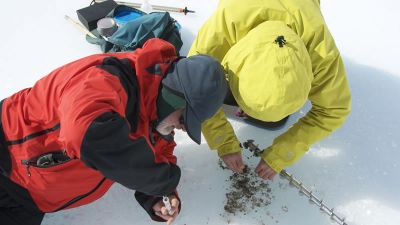
BELDIVA: Microbiology in Antarctica
The BELDIVA project aims to explore the microbial diversity within a 200 km radius around the Station and observe possible future changes in their diversity due to ecosystem change and human impacts.
Cyanobacteria, green algae, lichens and mosses carry out photosynthetic activity. The photosynthesis that produces oxygen was invented by cyanobacteria, around 3 to 2.5 billion years ago. By producing oxygen and fixing atmospheric CO2, they have contributed to the apparition of the atmosphere's composition as we know it today and to the expansion of all life forms on Earth. By endosymbiosis, they also are the ancestors of chloroplasts of the algae, mosses, and plants. Moreover, a large diversity of non-photosynthetic bacteria, with different ways of life, are present in all kinds of environment, even when those seem inhospitable.
In spite of their microscopic size, all these organisms are therefore important organisms. In addition, they serve as a food source for other organisms like nematodes and microarthropods. Taken together, they form a relatively simple ecosystem adapted to the extreme conditions of Antarctica.
Through the collected samples, the scientists seek to identify the microbial communities that are present in the eastern part of Antarctica, more specifically in the Queen Maud territory. They will be able to increase the number of available samples, analyse the biological history of this region and analyse future modifications induced by climate change or human impacts.
Several institutions participate in the project: University of Ghent (study of algae and bacteria), University of Liège (study of cyanobacteria) and National Botanic Garden of Belgium (study of lichens and mosses) in collaboration with the Museum National d'Histoire Naturelle (study of microarthropods), the Winogradsky Institute of Microbiology of Russian Academy of Sciences (study of cyanobacteria), the Institute of Botany of the Czech Academy of Science (study of cyanobacterial ecology) and the British Antarctic Survey (study of deglaciation history).
Picture: The BELDIVA team collecting samples from a cryoconite - © International Polar Foundation
